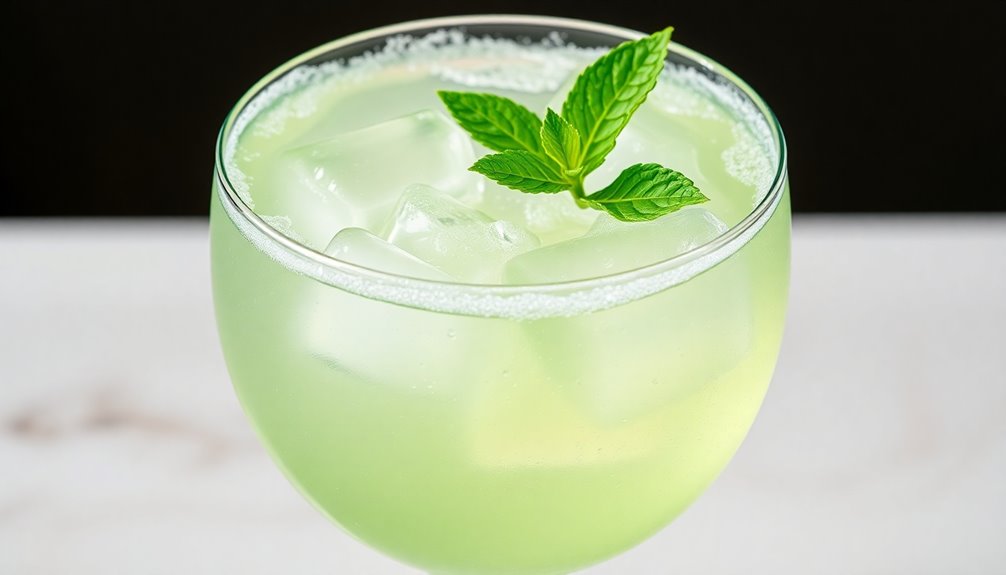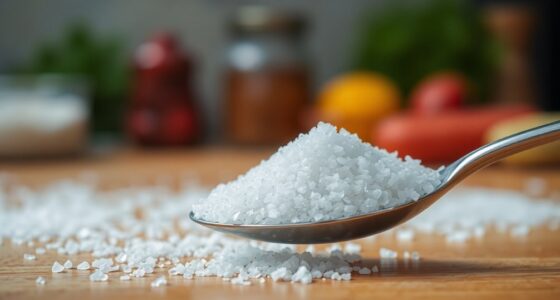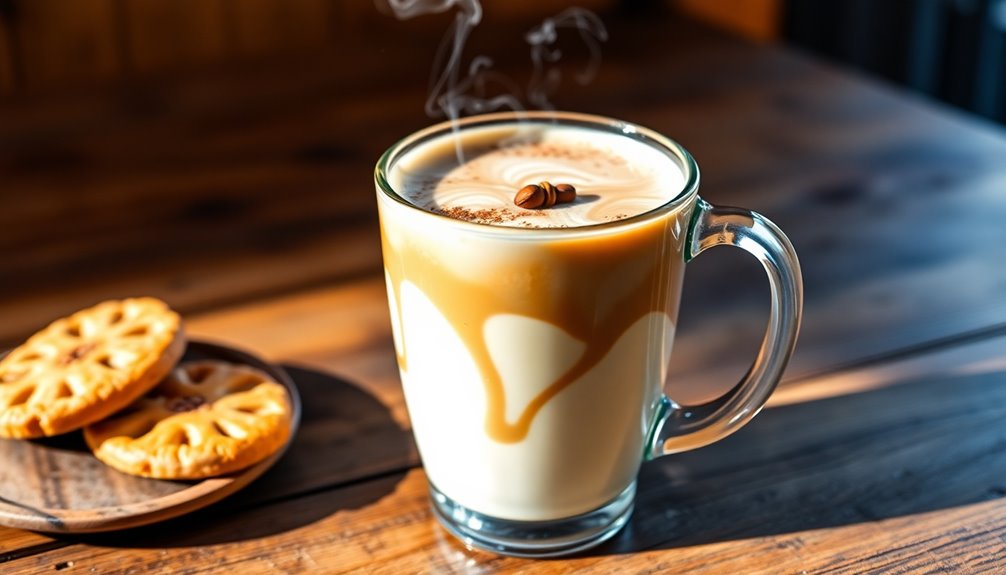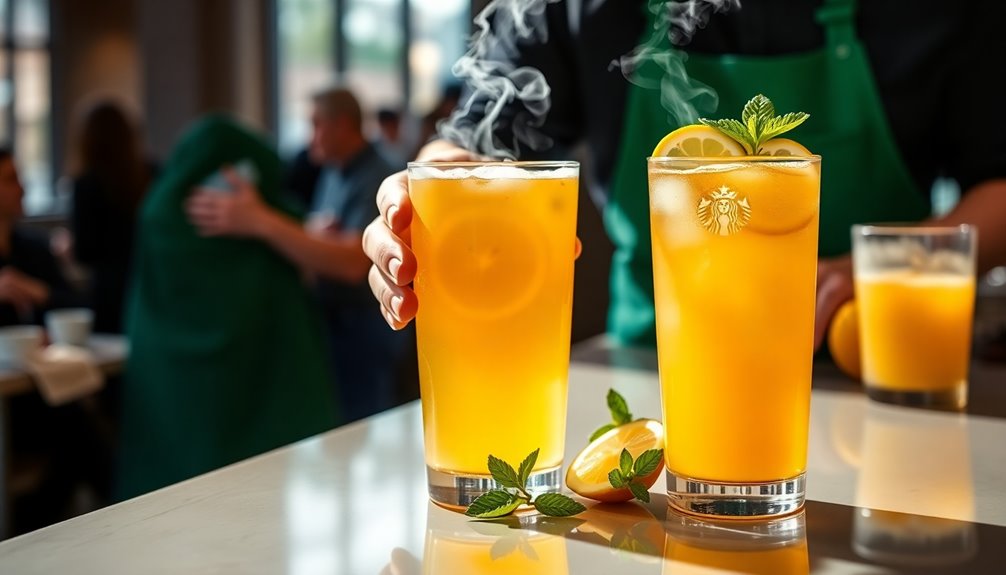When it comes to Pepsi, caffeine content varies between options. Regular Pepsi has about 37-38 mg of caffeine per 12 oz serving, while Diet Pepsi contains around 35-36.7 mg. If you're looking for a stronger boost, Pepsi Max offers approximately 69 mg per 12 oz, nearly double that of Regular Pepsi. Compared to brewed coffee, which has 95-200 mg in an 8 oz serving, Pepsi provides a milder kick. It's important to keep an eye on your total caffeine intake, especially if you're sensitive to it. Stick around, and you'll uncover more about these drinks and their impact on your health.
Key Takeaways
- Regular Pepsi contains 37-38 mg of caffeine per 12 oz serving, providing a moderate boost compared to coffee.
- Diet Pepsi has slightly less caffeine, with 35-36.7 mg per 12 oz, catering to those monitoring their intake.
- Pepsi Max offers a significantly higher caffeine content, with about 69 mg per 12 oz serving, appealing to energy-seeking consumers.
- Caffeine consumption for healthy adults should not exceed 400 mg daily; pregnant individuals should limit to 200 mg.
- Tracking total caffeine from all sources is essential for managing intake and avoiding withdrawal symptoms.
Caffeine Levels in Regular Pepsi

When you crack open a can of Regular Pepsi, you'll find that it contains about 37-38 mg of caffeine in a standard 12 fl oz serving. This amount of caffeine makes Regular Pepsi a moderate choice compared to other drinks.
If you opt for a 16.9 fl oz bottle, you'll get around 53 mg, while a 20 fl oz bottle packs about 63 mg. This caffeine content remains consistent across servings, making it easy for you to track your intake.
Unlike brewed coffee, which has 95-200 mg of caffeine per 8 oz serving, Regular Pepsi offers a gentler boost. For those monitoring their caffeine consumption, it's a reliable option without overwhelming levels found in energy drinks.
Caffeine in Diet Pepsi

When you compare Diet Pepsi to Regular Pepsi, you'll notice that it contains about 35-36.7 mg of caffeine per 12 oz serving, which is slightly less.
This moderate caffeine level makes it a great option if you're watching your intake but still want that familiar taste.
Plus, with its lower calorie count, Diet Pepsi offers a revitalizing choice without the extra calories.
Caffeine Comparison With Regular
While both Diet Pepsi and Regular Pepsi offer a similar taste experience, their caffeine content reveals a significant difference.
Diet Pepsi contains approximately 35-36.7 mg of caffeine per 12 oz serving, making it slightly lower in caffeine than Regular Pepsi, which has about 37-38 mg.
If you're watching your caffeine intake, these levels of caffeine in Diet Pepsi might appeal to you, allowing you to enjoy a cola without a hefty caffeine boost.
Notably, the caffeine content in Diet Pepsi is lower than other soft drinks like Diet Coke, which has a higher caffeine concentration.
Health Considerations for Consumers
Considering your health and caffeine intake, it's essential to be aware of the caffeine content in Diet Pepsi.
With approximately 35-36.7 mg of caffeine per 12 oz serving, it offers a lower caffeine option compared to Regular Pepsi and even Diet Coke. This reduced caffeine level makes Diet Pepsi appealing for those monitoring their caffeine intake while still enjoying a flavorful soft drink.
If you're sensitive to caffeine or looking to manage your overall caffeine consumption, Diet Pepsi can be a suitable choice. Its taste remains similar to Regular Pepsi, allowing you to enjoy the flavor without the higher caffeine levels.
Always keep these health considerations in mind as you make your beverage choices.
Caffeine in Pepsi Max

Pepsi Max packs a punch with about 69 mg of caffeine in a standard 12 oz serving, nearly double that of Regular Pepsi. This higher caffeine content makes Pepsi Max a popular choice for those seeking a greater energy boost without the added sugars found in regular soft drinks.
Some reports even suggest that the caffeine in Pepsi Max can reach up to 107 mg per 12 oz serving, depending on the source.
With its low-calorie profile and similar taste to Regular Pepsi, it appeals to consumers who want stimulation without the calories.
Comparison With Coffee

When it comes to caffeine content, black coffee clearly outshines Pepsi. A standard 330ml can of Pepsi packs about 35. 34mg of caffeine, while that same amount of brewed coffee contains around 138mg. This significant difference in caffeine content makes black coffee a popular choice for those seeking a stronger boost. To further compare, the caffeine content in Mountain Dew is also noteworthy, as a 330ml can contains about 54mg of caffeine, placing it in between Pepsi and brewed coffee. Ultimately, for caffeine enthusiasts, black coffee remains the superior option for a robust pick-me-up.
If you're looking for a serious caffeine boost, coffee is the way to go.
- Coffee can have nearly three to five times more caffeine per serving than Pepsi.
- Espresso boasts an impressive 63mg per 2oz, translating to about 212mg per 100ml.
- Compared to other caffeinated drinks, such as Red Bull, Pepsi's caffeine content is relatively low.
Impact on Sleep

If you enjoy a can of Pepsi in the afternoon or evening, you might find it harder to get a good night's sleep.
The caffeine content in Pepsi, about 35.34mg per 330ml can, can disrupt your sleep quality, especially if you're sensitive to caffeine.
Consuming caffeinated beverages later in the day means caffeine lingers in your system for hours, making it tough to fall asleep.
If you have a low tolerance for caffeine, even a small amount can greatly impact your sleep.
Plus, the sugar in Pepsi can lead to energy spikes and crashes, further complicating your ability to rest well.
To minimize the negative impact on sleep, it's best to enjoy Pepsi earlier in the day.
Caffeine Consumption Guidelines

Sleep quality can be considerably affected by caffeine intake, making it important to understand consumption guidelines. For most healthy adults, sticking to 400 mg of caffeine per day is generally safe.
However, if you're pregnant, it's best to limit your intake to 200 mg of caffeine daily and consult your healthcare provider. Additionally, if you have medical conditions or are sensitive to caffeine, closely monitoring your consumption is essential.
- Gradually reduce caffeine intake if you've been using it heavily to avoid withdrawal symptoms.
- Track cumulative caffeine from various sources, like Pepsi, to manage your total intake effectively.
- Always seek professional advice if you're unsure about your caffeine consumption guidelines.
Caffeine Content Labeling

When you check the caffeine content on a Pepsi label, you're gaining valuable insight into your daily intake.
These labels help you compare caffeine amounts across different beverages, making it easier to make informed choices.
Importance of Caffeine Transparency
How can consumers make informed choices about their caffeine intake without clear labeling? Caffeine transparency is essential for understanding how much caffeine you're actually consuming.
When brands like Pepsi include their caffeine content on packaging, it empowers you to compare options and manage your intake effectively.
- Labels typically disclose caffeine from all sources.
- Standard serving sizes help you gauge your consumption.
- Regulatory bodies endorse these practices for consumer awareness.
Standard Serving Size Comparison
Understanding the caffeine content of different Pepsi products can help you choose the right option for your needs.
A standard 12 fl oz serving of Regular Pepsi contains about 37-38 mg of caffeine, while a Diet Pepsi has slightly less, around 35-36.7 mg.
If you're looking for more caffeine, a 16.9 fl oz bottle of Regular Pepsi offers about 53 mg, and a 20 fl oz bottle packs around 63 mg.
For those wanting a boost, Pepsi Max delivers approximately 69 mg of caffeine in a 12 oz serving, nearly doubling Regular Pepsi's caffeine content.
Consumer Awareness and Choices
Ever wondered how much caffeine is in your favorite Pepsi? Understanding the caffeine content in your drinks is essential for making informed choices.
Pepsi voluntarily labels caffeine levels, promoting consumer awareness and helping you monitor your intake effectively.
- A 12 fl oz can of Regular Pepsi has about 37-38 mg of caffeine.
- Diet Pepsi contains slightly less, around 35-36.7 mg per 12 oz serving.
- If you're looking for a boost, Pepsi Max packs a punch with approximately 69 mg in a 12 oz serving.
This transparency allows you to manage your overall daily caffeine consumption, ensuring you stay within healthy limits while enjoying the flavors you love.
Always check the label!
Frequently Asked Questions
Is There a Lot of Caffeine in Pepsi?
You might be wondering if there's a lot of caffeine in Pepsi.
Generally, it contains less caffeine compared to coffee and many energy drinks. A standard 12 oz can has about 37-38 mg of caffeine, which is relatively low.
If you opt for a larger bottle, like a 20 oz, you'll find around 63 mg.
Is the Caffeine in Pepsi Enough to Keep You Awake?
If you're wondering whether the caffeine in Pepsi is enough to keep you awake, it really depends on your tolerance.
With about 37-38 mg of caffeine in a standard can, it's considerably less than what you'd find in coffee.
While some might feel a slight boost, others may not notice much of an effect.
If you need a stronger kick to stay alert, you might want to reach for coffee or an energy drink instead.
Which Has More Caffeine, Coffee or Pepsi?
Think of caffeine like a race car; coffee's the high-speed machine, while Pepsi's more like a leisurely cruise.
If you’re wondering which has more caffeine, coffee wins by a long shot. A typical 12 oz can of Pepsi has about 37-38 mg of caffeine, while coffee can pack anywhere from 95 to 200 mg per 8 oz serving. When comparing caffeine content, it’s also important to consider other popular drinks. For example, a 12 oz can of Coca-Cola has around 34 mg of caffeine, slightly less than Pepsi. If you’re looking for a lower calorie option, you might be wondering how much caffeine in Coke Zero. A 12 oz can of Coke Zero contains about 34 mg of caffeine, the same as regular Coca-Cola.
Which Pepsi Has the Least Caffeine?
If you're looking for the Pepsi with the least caffeine, you'll want to try Diet Wild Cherry Pepsi.
It contains only about 3.2 mg of caffeine per 12 oz serving, making it a great choice if you're sensitive to caffeine or just prefer a lighter option.
On the other hand, Diet Pepsi and Pepsi Made With Sugar have slightly higher caffeine levels, so if you want minimal caffeine, stick with Diet Wild Cherry Pepsi.
Conclusion
In summary, knowing the caffeine content in Pepsi products helps you make informed choices. Whether you're sipping Regular Pepsi, enjoying Diet Pepsi, or reaching for Pepsi Max, understanding their caffeine levels can guide your consumption. Balancing your intake with sleep needs and following caffeine guidelines guarantees you enjoy your favorite drink without the jitters. So, be aware, be mindful, and savor every sip—because when you know what you're drinking, you can enjoy it even more!










